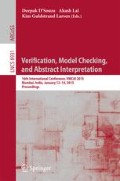Abstract
This paper combines the benefits of Polyhedral Abstract Interpretation (poly-AI) with the flexibility of Property Directed Reachability (PDR) algorithms for computing safe inductive convex polyhedral invariants. We develop two algorithms that integrate Poly-AI with PDR and show their benefits on a prototype in Z3 using a preliminary evaluation. The algorithms mimic traditional forward Kleene and a chaotic backward iterations, respectively. Our main contribution is showing how to replace expensive convex hull and quantifier elimination computations, a major bottleneck in poly-AI, with demand-driven property-directed algorithms based on interpolation and model-based projection. Our approach integrates seamlessly within the framework of PDR adapted to Linear Real Arithmetic, and allows to dynamically decide between computing convex and non-convex invariants as directed by the property.
This material is based upon work funded and supported by the Department of Defense under Contract No. FA8721-05-C-0003 with Carnegie Mellon University for the operation of the Software Engineering Institute, a federally funded research and development center. This material has been approved for public release and unlimited distribution. DM-0001643.
Access this chapter
Tax calculation will be finalised at checkout
Purchases are for personal use only
Preview
Unable to display preview. Download preview PDF.
References
Albarghouthi, A., Gurfinkel, A., Chechik, M.: Craig Interpretation. In: Miné, A., Schmidt, D. (eds.) SAS 2012. LNCS, vol. 7460, pp. 300–316. Springer, Heidelberg (2012)
Albarghouthi, A., McMillan, K.L.: Beautiful interpolants. In: Sharygina, Veith (eds.) [27], pp. 313–329
Bagnara, R., Hill, P.M., Zaffanella, E.: The parma polyhedra library: Toward a complete set of numerical abstractions for the analysis and verification of hardware and software systems. CoRR, abs/cs/0612085 (2006)
Bagnara, R., Hill, P.M., Zaffanella, E.: Widening operators for powerset domains. STTT 9(3-4), 413–414 (2007)
Benoy, F., King, A., Mesnard, F.: Computing Convex Hulls with a Linear Solver. TPLP 5(1-2), 259–271 (2005)
Biere, A., Bloem, R. (eds.): CAV 2014. LNCS, vol. 8559. Springer, Heidelberg (2014)
Birgmeier, J., Bradley, A.R., Weissenbacher, G.: Counterexample to induction-guided abstraction-refinement (CTIGAR). In: Biere, Bloem (eds.) [6], pp. 831–848
Bradley, A.R.: SAT-Based Model Checking without Unrolling. In: Jhala, R., Schmidt, D. (eds.) VMCAI 2011. LNCS, vol. 6538, pp. 70–87. Springer, Heidelberg (2011)
Cimatti, A., Griggio, A.: Software Model Checking via IC3. In: Madhusudan, P., Seshia, S.A. (eds.) CAV 2012. LNCS, vol. 7358, pp. 277–293. Springer, Heidelberg (2012)
Cimatti, A., Griggio, A., Mover, S., Tonetta, S.: IC3 Modulo Theories via Implicit Predicate Abstraction. In: Ábrahám, E., Havelund, K. (eds.) TACAS 2014. LNCS, vol. 8413, pp. 46–61. Springer, Heidelberg (2014)
Cimatti, A., Griggio, A., Sebastiani, R.: Efficient Generation of Craig Interpolants in Satisfiability Modulo Theories. ACM Trans. Comput. Log. 12(1), 7 (2010)
Cousot, P., Cousot, R.: Abstract Interpretation Frameworks. J. Log. Comput. 2(4), 511–547 (1992)
Cousot, P., Halbwachs, N.: Automatic discovery of linear restraints among variables of a program. In: Aho, A.V., Zilles, S.N., Szymanski, T.G. (eds.) POPL, pp. 84–96. ACM Press (1978)
de Moura, L., Jovanović, D.: A Model-Constructing Satisfiability Calculus. In: Giacobazzi, R., Berdine, J., Mastroeni, I. (eds.) VMCAI 2013. LNCS, vol. 7737, pp. 1–12. Springer, Heidelberg (2013)
Grebenshchikov, S., Lopes, N.P., Popeea, C., Rybalchenko, A.: Synthesizing software verifiers from proof rules. In: PLDI (2012)
Gulavani, B.S., Chakraborty, S., Nori, A.V., Rajamani, S.K.: Refining abstract interpretations. Inf. Process. Lett. 110(16), 666–671 (2010)
Gurfinkel, A., Chaki, S.: Boxes: A Symbolic Abstract Domain of Boxes. In: Cousot, R., Martel, M. (eds.) SAS 2010. LNCS, vol. 6337, pp. 287–303. Springer, Heidelberg (2010)
Halbwachs, N.: Détermination automatique de relations linéaires vérifiées par les variables d’un programme. PhD thesis, Grenoble (1979)
Hoder, K., Bjørner, N.: Generalized Property Directed Reachability. In: Cimatti, A., Sebastiani, R. (eds.) SAT 2012. LNCS, vol. 7317, pp. 157–171. Springer, Heidelberg (2012)
Kindermann, R., Junttila, T., Niemelä, I.: SMT-Based Induction Methods for Timed Systems. In: Jurdziński, M., Ničković, D. (eds.) FORMATS 2012. LNCS, vol. 7595, pp. 171–187. Springer, Heidelberg (2012)
Komuravelli, A., Gurfinkel, A., Chaki, S.: SMT-Based Model Checking for Recursive Programs. In: Biere, Bloem (eds.) [6], pp. 17–34
Komuravelli, A., Gurfinkel, A., Chaki, S., Clarke, E.M.: Automatic Abstraction in SMT-Based Unbounded Software Model Checking. In: Sharygina, Veith (eds.) [27], pp. 846–862
Korovin, K., Voronkov, A.: Solving Systems of Linear Inequalities by Bound Propagation. In: Bjørner, N., Sofronie-Stokkermans, V. (eds.) CADE 2011. LNCS(LNAI), vol. 6803, pp. 369–383. Springer, Heidelberg (2011)
McMillan, K.L.: Lazy annotation revisited. In: Biere, A., Bloem, R. (eds.) CAV 2014. LNCS, vol. 8559, pp. 243–259. Springer, Heidelberg (2014)
Rival, X., Mauborgne, L.: The trace partitioning abstract domain. ACM Trans. Program. Lang. Syst. 29(5) (2007)
Rümmer, P., Hojjat, H., Kuncak, V.: Disjunctive interpolants for horn-clause verification. In: Sharygina, N., Veith, H. (eds.) CAV 2013. LNCS, vol. 8044, pp. 347–363. Springer, Heidelberg (2013)
Sharygina, N., Veith, H. (eds.): CAV 2013. LNCS, vol. 8044. Springer, Heidelberg (2013)
Author information
Authors and Affiliations
Editor information
Editors and Affiliations
Rights and permissions
Copyright information
© 2015 Springer-Verlag Berlin Heidelberg
About this paper
Cite this paper
Bjørner, N., Gurfinkel, A. (2015). Property Directed Polyhedral Abstraction. In: D’Souza, D., Lal, A., Larsen, K.G. (eds) Verification, Model Checking, and Abstract Interpretation. VMCAI 2015. Lecture Notes in Computer Science, vol 8931. Springer, Berlin, Heidelberg. https://doi.org/10.1007/978-3-662-46081-8_15
Download citation
DOI: https://doi.org/10.1007/978-3-662-46081-8_15
Publisher Name: Springer, Berlin, Heidelberg
Print ISBN: 978-3-662-46080-1
Online ISBN: 978-3-662-46081-8
eBook Packages: Computer ScienceComputer Science (R0)

